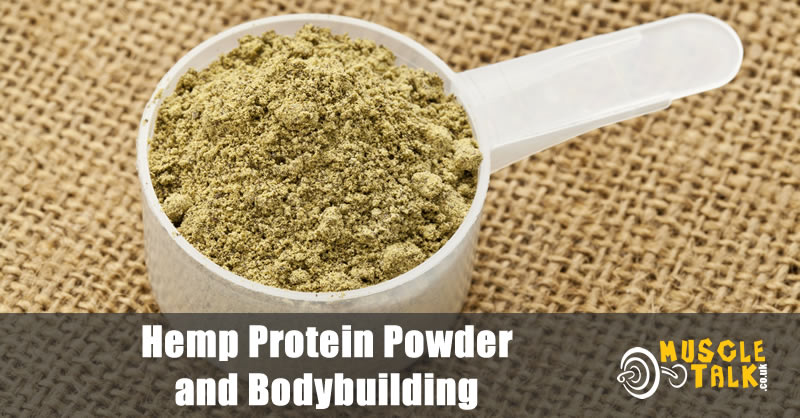In the recent article Pea Protein Powder as a Bodybuilding Supplement, the rise of vegan bodybuilding and suitable supplements were discussed.
Hemp protein is another protein powder supplement that’s been growing in popularity in bodybuilding with the increasing price of whey formulas as it has other nutritional qualities as well as providing protein.

Contents
What is Hemp Protein Powder?
Hemp protein is derived from hemp seeds. Hemp seeds are a popular seed snack as they’re relatively easy to grow and are high in protein and fibre as well as omega-6 polyunsaturated fats. Hemp seeds are also rich in B vitamins, iron, manganese, phosphorus and magnesium.
How is Hemp Protein Produced?
Hemp protein is produced from hemp seeds as follows:
- Hemp seeds are harvested
- The seeds are put into drums where blades thrash them about breaking the outer shell off exposing the seed inside
- Sifting to separate the shell fractions from the seeds
- Separating – this separates the hemp seed oil from the seeds which is extracted and can be sold as a separate product
- The remaining seed ‘cake’ is put into a dryer to evaporate all the remaining oil and any moisture
- The dried cake is then put back with the outer shell and they are mixed together, crushed and milled to a fine powder
Quality of Hemp Protein
There are a number of methods used to look at the quality of different proteins; these have been summarised in our Complete Guide to Whey Protein Supplements. Using the PDCAAS, the best quality proteins will have a score of 1.0 and hemp protein has a PDCAAS of 0.46, quite a bit lower than some other vegan proteins; for example pea (0.75) and soya (0.9).
However, no-one is going to consume no other foods other in their diet other than hemp protein powder; we’ll be consuming nuts, seeds, rice, oats, pulses, etc all of which have a different amino acid profile to hemp. Therefore, the proteins in combination make a complete protein, more than enough to, not only meet basic nutritional requirements, but also to provide plenty of protein for hard training and optimum muscle growth.
Nutritional Value of Hemp Protein
A typical hemp protein powder will contain, per 100g, 45-50g protein, around 15g carbs and around 12.5g fat. As you can see, hemp protein powders are notably lower in protein contact than many other protein powders, so as a dietary supplement, hemp protein needs to be consumed for it’s other nutritional qualities in addition to protein.
The fatty acid profile is favourable with 1.3g saturates, 1.6g monounsaturated, 2.3g omega-3 polyunsaturates and 7.3g omega-6s. Hemp protein formulas are also high in dietary fibre with a whopping 20g+ per 100g.
Hemp protein is also rich in vitamin E, potassium, calcium, magnesium and iron.
Amino Acid Profile of Hemp Protein
The typical values of each amino acid in mg per 100g of hemp protein powder are:
| Alanine | 2180 |
| Arginine | 5200 |
| Aspartic acid / asparagine | 5160 |
| Cysteine | 1350 |
| Glutamic acid / glutamine | 8620 |
| Glycine | 2220 |
| Histidine | 1330 |
| Isoleucine | 1780 |
| Leucine | 3470 |
| Lysine | 2110 |
| Methionine | 1620 |
| Phenylalanine | 2090 |
| Proline | 2180 |
| Serine | 2710 |
| Tryptophan | 780 |
| Tyrosine | 1740 |
| Valine | 2300 |
As you can see, hemp protein is low in the amino acids cysteine, histidine and tryptophan, which is why it doesn’t score high on the PDCAAS. However, hemp protein is high in other amino acids especially arginine, aspartic acid, glutamic acid and leucine.
What are the Benefits of Hemp Protein?
Hemp protein benefits include:
- It’s vegan
- It mixes easily
- It’s rich in some amino acids including the branched chain amino acid leucine
- It has a favourable fatty acid profile
- It’s rich in dietary fibre
- It’s high in calcium
Are there any Side Effects from Using Hemp Protein Powder?
There may be side effects initially when introducing hemp protein to your diet. These may include loose stools, bloating and flatulence and happen because of the high fibre content, especially if you’re not used to consuming high fibre foods.
Where can I find Hemp Protein?
Many well known brands now include a hemp protein formula as part of their range either as hemp protein powder or as part of a vegan protein formula. It’s available in different flavours or as unflavoured. A number of brands have organic hemp protein powder formulas if you prefer to stick to organic products.
Hemp Protein Powder Recipes
Hemp protein powder can be consumed simply mixed well with water, or it can be incorporated into a number of smoothies: simply add berries or melon, or you can blend the powder with other seeds as well as fruit. Due to the fatty acid profile, it’s not wise to heat hemp protein powder too much or the fats may oxidise and become rancid making them bad.
